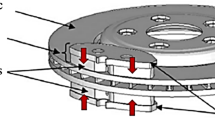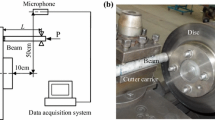Abstract
The paper deals with friction induced vibrations and especially with railway disc brake squeal. The first part of the paper is devoted to the strategy used to model the general problem of self-excited vibrations of a rotating disc in frictional contact with two pads. Unilateral contact conditions with Coulomb friction and constant friction coefficient are considered. In order to predict the occurrence of self-excited vibrations, a classical stability analysis is performed, which consists on computing the complex modes associated to the linearised problem. A common interpretation of the stability analysis is that frequencies of unstable complex modes correspond to squeal frequencies. To check this assumption, the behaviour of the solution far from the sliding equilibrium is determined by using a non linear transient analysis. Moreover, an expansion of the transient solution on the complex modes provided by the stability analysis helps us to highlight the role of the unstable modes. The second part of the paper focuses on the application of the approach to the TGV disc brake system. Results on complex modes are presented and compared with measurements. The interest of both analyses is discussed.
Access this chapter
Tax calculation will be finalised at checkout
Purchases are for personal use only
Preview
Unable to display preview. Download preview PDF.
Similar content being viewed by others
References
Moirot, F., Nguyen, Q.S.: Brake squeal: a problem of flutter instability of the steady sliding solution? Arch. Mech. 52, 645–661 (2000)
Moirot, F.: Etude de la stabilité d’un équilibre en présence de frottement de coulomb. PhD Thesis, Ecole polytechnique, Palaiseau, France (1998)
Jean, M.: The non-smooth contact dynamics method. Comput. Methods Appl. Mech. Eng. 177, 235–257 (1999)
Vola, D., Pratt, E., Jean, M., Raous, M.: Consistent time discretization for a dynamical frictional contact problem and complementarity techniques. REEF 7 (1998)
Balmès, E.: Structural Dynamics Toolbox (2006), http://www.sdtools.com
Author information
Authors and Affiliations
Editor information
Rights and permissions
Copyright information
© 2008 Springer-Verlag Berlin Heidelberg
About this paper
Cite this paper
Lorang, X., Chiello, O. (2008). Stability and Transient Analysis in the Modelling of Railway Disc Brake Squeal. In: Schulte-Werning, B., et al. Noise and Vibration Mitigation for Rail Transportation Systems. Notes on Numerical Fluid Mechanics and Multidisciplinary Design, vol 99. Springer, Berlin, Heidelberg. https://doi.org/10.1007/978-3-540-74893-9_63
Download citation
DOI: https://doi.org/10.1007/978-3-540-74893-9_63
Publisher Name: Springer, Berlin, Heidelberg
Print ISBN: 978-3-540-74892-2
Online ISBN: 978-3-540-74893-9
eBook Packages: EngineeringEngineering (R0)




